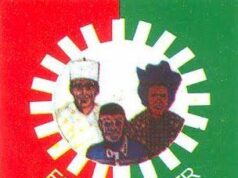The Nigeria Labour Congress (NLC) has firmly rejected the assertion by state governors, represented by the Nigeria Governors’ Forum (NGF), that they cannot afford a minimum wage of N60,000, urging them to avoid creating a national crisis.
 Advertorial
Advertorial
In response to the governors’ claim that the proposed minimum wage is unrealistic, NLC spokesperson Benson Upah accused the governors of misrepresenting their financial capabilities.
He pointed out that the Federation Account Allocation Committee (FAAC) allocations have increased significantly, thus enhancing the states’ ability to pay higher wages.
 Advertorial
Advertorial
Halima Ahmed, Acting Director of Media Affairs and Public Relations for the NGF, stated that implementing the N60,000 minimum wage would force many states to use their entire monthly allocations to cover salaries, with some potentially needing to borrow.
Contradicting this, Upah highlighted that FAAC allocations have risen from N700 billion to N1.2 trillion, making state governments financially capable of meeting the proposed wage.

Upah stated: “The governors’ claim that they cannot afford N60,000 as a minimum wage is unfounded. FAAC allocations have increased from N700 billion to N1.2 trillion, making the governments wealthier while neglecting the people’s needs.
“We are alarmed by the NGF’s statement suggesting states cannot pay N60,000, with some needing to borrow monthly. This claim, made during ongoing negotiations, shows bad faith and poor judgment.”

“The governors can afford a reasonable national minimum wage by cutting the high cost of governance, minimizing corruption, and prioritizing workers’ welfare. A national minimum wage is a baseline to protect the weakest and poorest workers, not a fixed pay structure for different states.”
Upah emphasized the need to consider economic realities: “In 2019, N30,000 was roughly equivalent to $100 with an exchange rate of N300 to $1 and 11.40% inflation.
“Today, with the exchange rate at N1,600 to $1 and inflation at 33.7% (40% for food), the minimum wage is effectively $37.5 for a family of six. Costs have risen over 400% due to fuel subsidy removal, making this dire for the poor.”

“Government policies on fuel subsidy removal, severe Naira devaluation, a 250% energy tariff hike, and a 26.5% interest rate increase are damaging the economy, especially for the manufacturing sector and the poor. This has resulted in reduced consumer spending and overflowing warehouses in the productive sector.
“Paying a meager national minimum wage poses a significant risk to both the workforce and the national economy, as state economies are largely driven by workers’ wages. We urge the governors to reconsider their stance to prevent a potential economic downturn.”

The NLC’s firm stance calls for state governors to re-evaluate their financial management strategies to ensure fair compensation for workers and support the national economy.

















